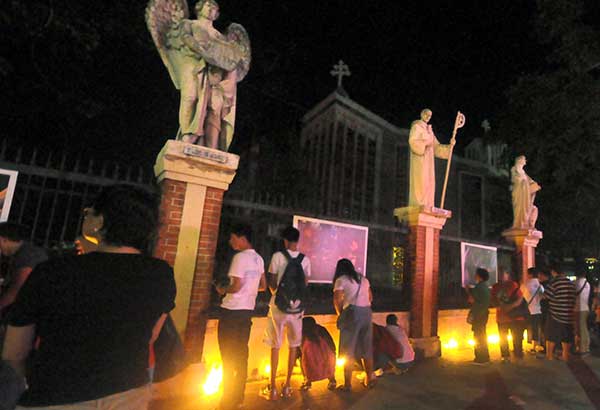Government: Security, human rights not incompatible

40 DAYS OF MOURNING: People offer candles and prayers at the gates of the St. John the Evangelist Cathedral in Dagupan, Pangasinan on Saturday night as church bells began ringing for the 40 days of mourning for thousands of people killed in the government’s war on illegal drugs. CESAR RAMIREZ
MANILA, Philippines — Foreign Affairs Secretary Alan Peter Cayetano has called on countries critical of the government’s ongoing campaign against illegal drugs to respect the Philippines’ sovereignty and not tell the nation’s leaders what to do.
“Security and human rights are not incompatible. Indeed, the first is our duty to the other. Without security, the most basic human rights, to life and safety, are constantly under attack – from terrorism, criminality, drug and human trafficking,” Cayetano told delegates at the 72nd Session of the United Nations General Assembly in a statement he delivered during the gathering’s high-level debate in New York yesterday.
“The Philippines expects… that its democratically elected government’s assessment of threats and how to go about addressing them shall be accorded preeminence among nations — or at least the benefit of their doubt,” Cayetano, who is representing President Duterte in the annual diplomatic event, said in his first appearance on the world stage.
Justifying the government’s campaign against illegal drugs, Cayetano underscored that it is a “necessary” instrument to preserve and protect the human rights of all Filipinos and never used to violate human rights.
He explained that the reason Duterte launched his campaign against the illegal drug trade is to save lives, preserve families, protect communities and stop the country from turning into a narco-state.
“The very principle of the responsibility to protect must encompass first and foremost the vast majority of peaceful law-abiding people who must be protected from those who are not,” Cayetano said. “It is for their safety and sustenance that states exist, and for which governments and leaders are responsible.”
He also cautioned other UN member states against misinformation about the war on drugs.
“Accusation before investigation is not proof. Nor is it fair. Abuses have occurred and mistakes have been made, tragic ones for sure,” Cayetano said.
While abuse is one too many, according to him, they are far fewer than the imaginary numbers of partisan accusers and publicity seekers.
“We should never tolerate human rights abuses but neither should we tolerate misinformation, fake news on and politicization of human rights, for these undermine our collective efforts as the United Nations to uphold the universality of human rights and dignity of human life,” he added.
The Cabinet secretary gave assurace that the Philippines will continue to uphold human rights in carrying out its responsibility to protect Filipinos from the threat posed by illegal drugs, criminality and terrorism.
“The Philippines integrates the human rights agenda in its development initiatives for the purpose of protecting everyone, especially the most vulnerable, from lawlessness, violence and anarchy,” Cayetano said.
In the same statement, delivered a day after the UN Human Rights Council (UNHRC) in Geneva adopted the Third Universal Periodic Review Report of the Philippines, Cayetano reiterated Manila’s commitment to its human rights obligations under the international treaties it has ratified.
Cayetano stressed that it is the duty of any state to protect human life, human dignity and human rights from aggression by other states, terrorism from non-state actors and the destruction of societies and families from criminal networks trafficking in drugs, people and arms.
The Philippines joined the European Union’s list of countries with human rights situations that require the attention of the UNHRC.
At the 36th Session of the UNHRC in Geneva last Sept. 19, the EU said it “remains deeply concerned about the high number of killings” in the Philippines.
While the EU acknowledged that the fight against drug crime, including against drug syndicates, in the Philippines is an important priority for the government, the EU emphasized the “importance of carrying out the fight against illegal drugs in full compliance with due process, national law and international human rights law.”
“It is important that all cases of death should be promptly and effectively investigated in an impartial and transparent manner, which ensures appropriate prosecution of those responsible,” the EU said in its statement “Item 4: Human Rights Situations that require the Council’s attention” delivered before the UNHRC.
The EU said the regional bloc is highly committed to the promotion and protection of human rights worldwide and welcomed this opportunity to discuss “human rights situations that require the Council’s attention,” emphasizing the role of the Council as an important early warning tool.
Sufficient human rights training
Despite alleged human rights violation of some of its policemen, Philippine National Police spokesman Chief Supt. Dionardo Carlos maintained the PNP has sufficient training for its personnel on the value and respect for human rights.
Carlos said that aside from the regular training, the PNP Human Rights Affairs Office (HRAO) also conducts regular lectures on how police should value and respect human rights of every citizen.
Incoming and active policemen, commissioned and non-commissioned, have to undertake courses on human rights, which are already incorporated in their training programs, according to Carlos.
“Our training from the start has the component of human rights, observance and respect from recruit courses to specialized courses,” he said. “It’s a continuing process, so if you are already in the PNP, it is really a good program. While our personnel work, they are constantly reminded.”
The PNP has been receiving criticism after some policemen were involved in apparent violation of human rights, particularly on the killings of Kian Loyd delos Santos and Carl Angelo Arnaiz, both teenagers, during anti-illegal drug and anti-crime operations in Caloocan City.
Carlos said the PNP-HRAO under Chief Supt. Dennis Siervo also reminds policemen to observe and respect local and international laws on human rights. – With Cecille Suerte Felipe
- Latest
- Trending
































